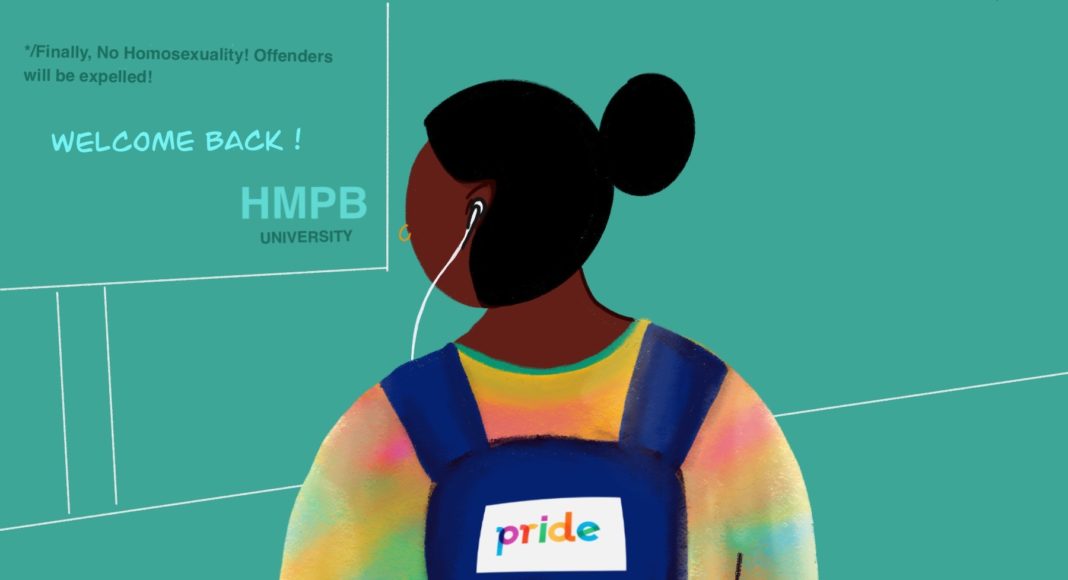By Shade Mary-Ann Olaoye
In December 2020, the umbrella body for Nigerian lecturers, the Academic Staff Union of Universities (ASSU) called off its strike, and schools began resuming classes. After months of staying at home and forging a life for themselves in the pandemic, queer Nigerian students who raised placards during the #EndSars movement, mobilized support for #QueerNigerianLivesMatter in the middle of oppression, and advocated with their writings and videos now have to deal with the anxiety of going back to a homophobic university environment and learning to live with it.
“Nigerian universities are hostile spaces for queer people. It became even more so after the SSMPA (Same Sex Marriage Prohibition Act) of 2014. The anti-gay law sort of ’empowered’ homophobic students to enforce the mandatory heterosexuality that the law prescribes,” said Onyemuche Anele Ejesu, a lecturer at the University of Nigeria, Nsukka. “There are stories of extortion, assault, intimidation, and so on. Queer students are helpless in Nigerian universities. Who do you report the assault and intimidation to? The police or the administration?”
This inability to seek justice for fear of further harassment makes things more difficult.
“I hated the fact that I had to go back to school and seat with my bigoted classmates. When I’m in school because I am femme, I’m being restricted from a lot of things like; going to places and interacting with certain persons. I get asked by a lot of people why I behave like a girl, and before you know it, they are hitting you hard,” explained Ugonna-Ora. He said he has witnessed his friend getting brutalized for “walking the way he has walked his entire life.”
Vicwonder started a YouTube channel to document and share his experiences as an openly gay man living in Nigeria. He speaks on how classmates who found his coming out video made insinuations about how he was going to be cut off from academic circles important to his grades. Starting a YouTube channel was like therapy, apart from homophobic comments here and there, people’s reaction towards his content was amazing and they let him know in the comment section.
With the resilient spirit of young Nigerians and their ability to make the best of difficult situations, the 10-month strike led many to new learning processes and a diversification of their talents and opportunities. For some queer Nigerian students, the time off gave space for them to develop their voice and grow their crafts, which in turn helped them become stronger advocates in the best way they know how. Some students from Lagos who attend university in other states worry because although Lagos is still homophobic, it is slightly more manageable than other areas.
“I think what the strike did was to avail me to do more. Strength has always resided in me and I had already informed my course mates and lecturers of my queerness by living with it and owning the totality of it,” said Matthew, a student who got featured in documentaries and publications during the strike action. Going back to a threatening, traumatic environment is a major re-adjustment, especially with new circulation of life-threatening publications against them. Since their involvement in documentaries, they have received threatening messages in their inbox and through their friends.
“There is this loneliness I feel whenever I am in school, no support system and it’s just crazy. So the idea of resuming was wild, depressing, and a mixture of other feelings,” Matthew said.
Keeping safe and ensuring protection for the LGBTQIA+ community still remains an issue, as the deeply rooted homophobia in certain parts of Nigeria from people who are unwilling to unlearn and evolve, harass queer people without fear of any consequences from doing so. This is why queer students have taken it upon themselves to figure out ways to navigate the walls of their institutions and reduce the risk of getting harassed.
For Ugonna, he avoids places that do not look out for him or his safety. He avoids being in the company of men and meeting people that might be discriminatory towards his sexuality.
And sometimes, you have to be physically prepared. “Apart from carrying a pair of scissors with me, (I don’t even know how that can help), I don’t really protect myself. I am quite fit so I believe I can handle myself in a one on one,” Vicwonder said.
Other times, though, you simply have to run, explained Matthew. “I run and don’t look back in some cases. I get into my house and bolt my doors. Looking out for myself shouldn’t make me act like a fugitive, but this house is on fire and I have to ensure my safety so that I will build another day.”


